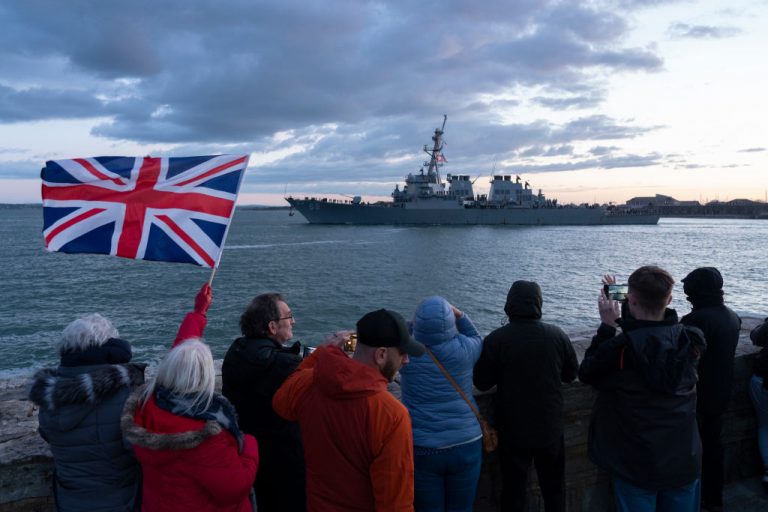British Royal Navy aircraft carrier HMS Queen Elizabeth set sail for a seven-month-long voyage to Asia. During a recent visit to Portsmouth Naval Base in the southern English coast, Prime Minister Boris Johnson said the deployment will show “our friends in China” that Britain believes in the “international law of the sea.”
The 65,000-ton HMS Queen Elizabeth aircraft carrier will carry 10 U.S. Marine Corps F-35 and eight British F-35B fighter jets onboard. It will have a 1,700 member crew, including 250 U.S. marines.
The carrier will lead a flotilla that includes two frigates, two destroyers, two support ships, and a submarine. It will also be joined by a frigate from the Dutch Navy and a destroyer from the U.S. Navy. The flotilla will carry 3,700 personnel and 32 aircraft in total.
“We don’t want to antagonize anybody, but we do think that the United Kingdom plays a very important role, with friends and partners, the Americans, the Dutch, the Australians, the Indians many, many others, in upholding the rule of law, the international rules-based system on which we all depend,” Johnson said to reporters aboard the carrier.
The journey will span 26,000 nautical miles and last for 28 weeks, during which the Carrier Strike Group will be in contact with over 40 nations. It will pass through the Mediterranean Sea and the Indian Ocean to make way towards Asia where the Group is expected to sail through the South China Sea, many parts of which are (contentiously) claimed by the Chinese Communist Party (CCP) and contested by neighboring nations.
Success
You are now signed up for our newsletter
Success
Check your email to complete sign up
“I don’t expect to see aggression from China when UK forces with their allies are going about activity in a very legal and clear manner. We’ve got to put an onus on these countries to behave responsibly. We’re behaving responsibly and we will expect other nations to behave responsibly as well,” Admiral Tony Radakin, First Sea Lord said to The Telegraph.
Although the British naval fleet is an important power globally, it is not as strong as it used to be. As of January, the Royal Navy has a modest 79 commissioned ships.
During World War II, Britain was able to send over 900 warships on D-Day 1944 across the English Channel. During the Falkland Wars in 1982, Britain was able to quickly scramble 115 ships.
Despite plans to sail through the South China Sea, HMS Queen Elizabeth will not sail through the Taiwan Strait.
Admiral Lord West, former First Sea Lord, whitewashed the decision to not challenge communist China in comments to The Telegraph, “I think it’s enough of a statement by going through the South China Sea…You don’t need to rub people’s faces in it by travelling through the Formosa Strait.”
The CCP claims that its nine-dash line that encompasses a major portion of the South China Sea is the real international border. In 2016, an arbitral tribunal under United Nations Convention on the Law of the Sea (UNCLOS) declared that China’s territorial claims inside the nine-dash line carries no legal validity. Beijing has rejected the judgment and is in subsequent conflict with neighboring countries like Japan, Vietnam, and Philippines.
In April, the EU criticized China for sending ships to the Whitsun Reef, which the Philippines consider to be part of their exclusive economic zone. In a statement, the EU accused Beijing that its actions were endangering “peace and stability in the region,” reported Reuters.
More recently, Beijing complained about U.S. Navy activity in the South China Sea, accusing Washington of intruding into the waters surrounding the Paracel region that is also claimed by Vietnam, reported AP News.
The CCP was defensive about the presence of destroyer USS Curtis Wilbur, and claimed the People’s Liberation Army Navy “warned and expelled” the ship from the waters.
The Communist Party’s claims were debunked by the U.S. Navy, however, “The PLA’s statement about this mission is false. USS Curtis Wilbur was not ‘expelled’ from any nation’s territory. USS Curtis Wilbur conducted this FONOP (freedom of navigation operation) in accordance with international law and then continued on to conduct normal operations in international waters,” a statement from the U.S. fleet said.







